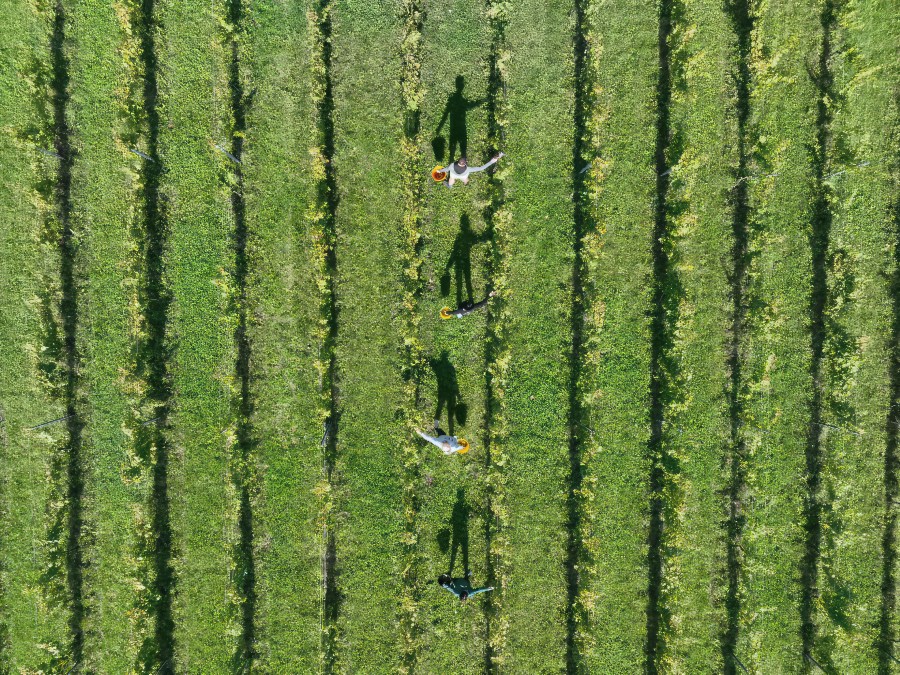The 2023 grape harvest is complete and the team at Albury Organic Vineyard in Surrey are celebrating a huge crop.
Predictions of a ‘great year’ for English winemakers started back in May, when Spring arrived and passed with minimum frost damage. A very wet July saw the berries swell with water but also led to concern that mildew would hit the fruit, a potential disaster for the Albury team who manage their vineyard organically.
“Warm weather is crucial to ensure that a large crop is also a quality one. At one stage we were worried that all the rain would cause disease and, as we’re an organic vineyard, we can’t rely on systemic sprays to combat this” said vineyard owner Nick. “The September sunshine was a welcome relief and we’re delighted that the 2023 harvest has turned out to be exceptional both in terms of quantity and quality”.
Harvest began at the beginning of October and took place over three weeks of glorious sunshine and blue skies. With so many grapes to pick, the Albury team were lucky to have a record number of willing volunteers from the Albury wine club and the local community wanting to lend a hand with the grape picking.
“Nearly 300 people were involved in the harvest this year and we couldn’t have managed without them” tells Lucy, Nick’s daughter, who is General Manager at Albury. “Our wine club members even helped us crush some of the grapes!” she said.
As an organic and biodynamic vineyard, the team at Albury adopt a different approach to winemaking and this year’s conditions created the perfect opportunity to focus on a more natural technique.
A group of volunteers joined Nick and his vineyard managers to make a ‘Pied de Cuve’. “This involved picking a few buckets of Chardonnay grapes, de-stemming the berries and crushing them by hand” explains Nick. “We left the juice to ferment from wild yeasts found naturally occurring in the vineyard, giving the wine a ‘sense of place’ or ‘terroir’ as the French would say. 10 days later, we added the fermenting Pied de Cuve to the rest of the Chardonnay which continues fermenting in the winery – not in a barrel or tank, but in a concrete egg. As far as we know, we’re one of only two producers in the UK making wine in eggs!”
Rather than a new winemaking trend, the idea of using egg-shaped fermenters has been around since ancient times according to findings of archaeologies in Georgia who unearthed clay pots known as ‘qvevri’. Similar objects named ‘amphora’ were then found in Greece and Rome before barrels became the preferred means of storing and transporting wine.
The first modern egg-shaped wine fermenter was produced in 2001 and the egg’s smooth surface allows the wine to move continuously and freely whilst always remaining in contact with the yeast so more complex flavours develop than in a barrel or tank. “At the same time, the semi-porous concrete allows the wine to ‘breathe’, softening the tannins while the liquid ages” explains Matthieu, Albury’s winemaker. “This is difficult to achieve in a tank and, whilst barrels allow air in, they also impart oak flavours which we don’t always want in our wines” he said.
In total, Albury harvested nearly 54 tonnes of fruit from their vineyards. “We’re likely to produce around 45,000 bottles of wine from the 2023 vintage. Most of these won’t be ready for drinking until 2026 but we look forward to releasing our still wine – Silent Pool Rosé in May” summed up Nick.
- Albury team: Alex, Nick, Dominic
- Harvest time at Albury Organic Vineyard in the Surrey Hills. The vineyard are currently harvesting grapes including Pinot Noir, Chardonnay, Pinot Meunier and Seyval Blanc. The vineyard is set over 5 Hectares with this years harvest expected to result in 20,000 bottles of English Sparkling wine. ©Chris Gorman / Big Ladder














